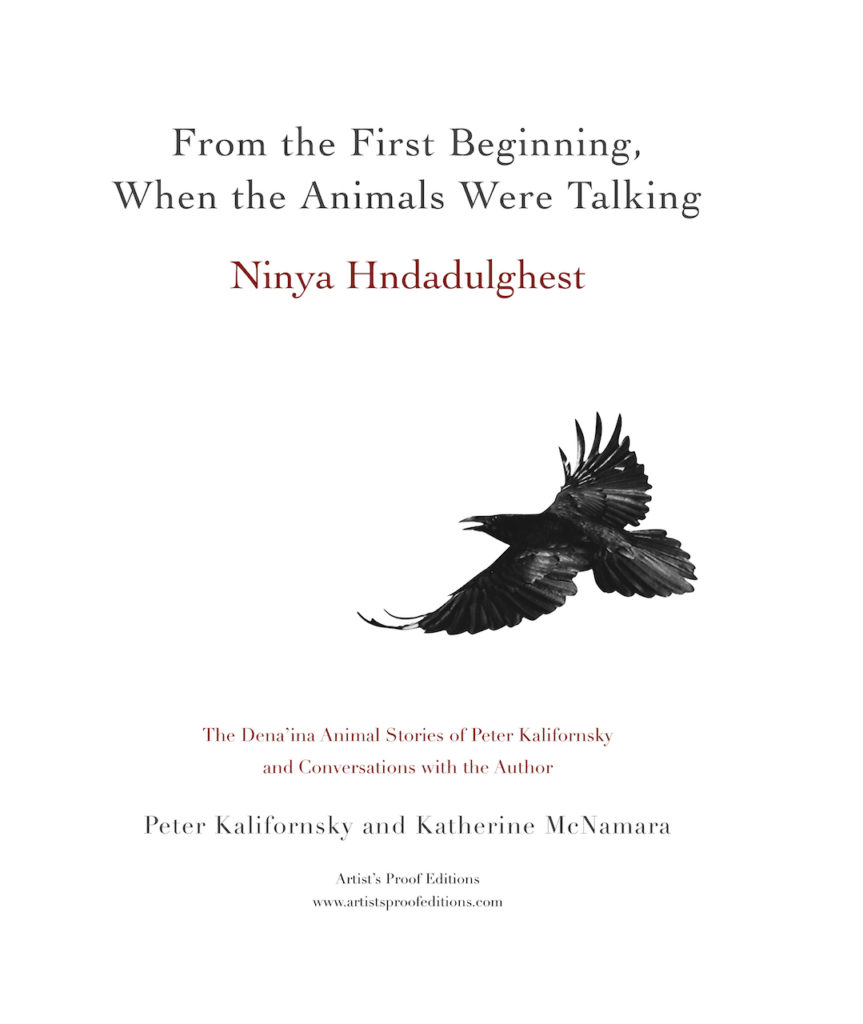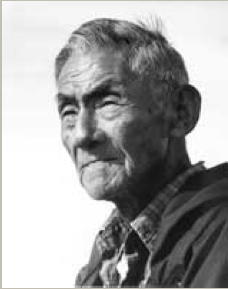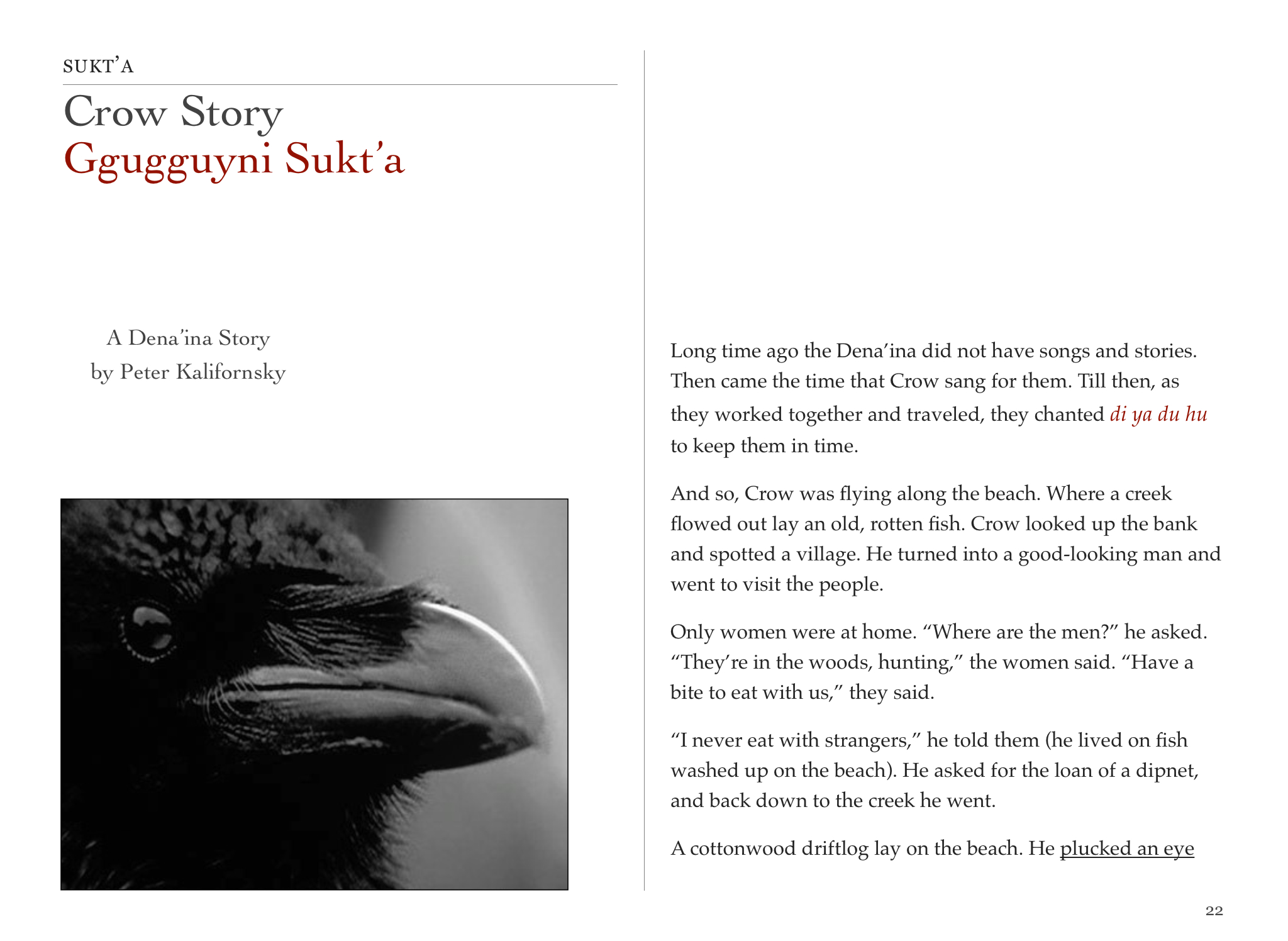
A multi-touch book for the iPad and Mac Available on Apple Books
We enter a world dense with story, dense with meaning . . .
Peter Kalifornsky (1911-1993) was a member of the Kenaitze Indian Tribe, a Dena’ina Athabaskan who lived in Kenai, Alaska. He was the last speaker of his language—a version of Dena’ina—and the first to bring it into written literature. Among his ancient tales was Ggugguyni Sukt’a, Crow Story, which tells how Crow (the Raven) gave songs and their first story to the Campfire People.
Long time ago, it begins, the Dena’ina did not have songs and stories. Then came the time that Crow sang for them. Till then, as they worked together and traveled, di ya du hu kept them in time . . . .

In 1984, a young poet named Katherine McNamara came to Peter Kalifornsky’s door. She was fascinated by Crow Story. The old man was pleased that a visitor wanted to talk about its meaning. “I wrote that story, yes, in my native language. It’s written; and all I was fighting for was to preserve my native language,” he said. “But what we’re getting into—how to read the background—gets complicated.”
So began their friendship, which grew into a five-year collaboration. They brought his stories and essays into new American versions, and, as she listened and wrote, he told her of larger things. The power of the animals. The Mountain People and the mother and father of the animals. The law and regulations of the old Dena’ina, and their elaborate protocol. The training of the shamans, the sky readers, the doctors, the Man Whose Word Comes True. Their poetics and theory of story.
From the First Beginning, When the Animals Were Talking, The Animal Stories, is the first of four volumes. It includes Peter Kalifornsky’s animal stories, from his Dena’ina texts, in their joint American translation matched with his conversations with Katherine McNamara, so that the tales and their ”back story” speak to each other. This multi-touch edition allows the reader to follow Kalifornsky’s stories and his thoughts about them, simultaneously.
Interactive materials include audio files of Peter Kalifornsky reading in Dena’ina and galleries of his manuscript pages. The stories are annotated and cross-linked to conversations and the glossary. The edition is updated periodically, as new digital materials are added. The volume is available on Apple Books without charge.
Vol. 2, From the Believing Time, When They Tested for the Truth is also available on Apple Books.
Among the very old tales that Peter Kalifornsky wrote, in his own interpretation, or sukt’a, was Ggugguyni Sukt’a, Crow Story, which tells how Crow (the Raven) gave songs and their first story to the Campfire People.
Read and listen to Peter Kalifornsky’s “Crow Story.”
Readers have commented:
From the First Beginning, the Journal of the Kalifornsky Project
From the Believing Time, When They Tested for the Truth
Peter Kalifornsky was born on Oct. 12, 1911, in Kalifornsky village, Kenai Peninsula, Alaska.
Considered the last speaker of his Dena’ina language, which is of the Northern Athabaskan language group, Peter Kalifornsky was dedicated to preserving his language through his published writings, recordings, and teachings. He was the son of Nikolai Kalifornsky (1884-1965), grandson of Aleksay Kalifornsky (1867-1926), great-grandson of Feodore Kalifornsky (1826-1896), and great-great-grandson of Qadanalchen, chief of the Kalifornsky Village, who received his surname while at Fort Ross in California. His mother, who died when he was two, came from the distinguished Chickalusion family. Her brother, Simeon Chickalusion, was the last traditional chief of the Cook Inlet Dena’ina.
Peter Kalifornsky died on June 5, 1993, in Nikiski, Kenai Peninsula Borough, Alaska.
His published books:
- Kalifornsky, Peter. Kahtnuht’ana Qenaga: the Kenai People’s Language. Edited by James Kari. Fairbanks: Alaska Native Language Center, University of Alaska, 1977.
- _________. K’tl’egh’I Sukdu: Remaining Stories. Edited by Jane McGary, and James Kari. Fairbanks: Alaska Native Language Center, University of Alaska, 1984.
- _________. A Dena’ina Legacy — K’tl’egh’I Sukdu: the Collected Writings of Peter Kalifornsky. Edited by James Kari, and Alan Boraas. Fairbanks: Alaska Native Language Center, University of Alaska, 1991.
- _________ and Katherine McNamara. From the First Beginning, When the Animals Were Talking: the Animal Stories of Peter Kalifornsky. Translated by Peter Kalifornsky, and Katherine McNamara. Edited by Katherine McNamara. Vol. I, From the First Beginning, When the Animals Were Talking. Charlottesville, Virginia: Artist’s Proof Editions, 2014.
Katherine McNamara, editor and publisher, is the author of a non-fiction narrative, Narrow Road to the Deep North, A Journey into the Interior of Alaska, and founding editor and publisher (1996-2007) of Archipelago, a journal of literature, the arts, and opinion published on the Web. She directs Artist’s Proof Editions and is an iBooks producer. She is has been a Fellow several times at Virginia Foundation for the Humanities, and is a member of the Virginia Arts of the Book Center. She has spoken about the work of Peter Kalifornsky as writer and theoretician of writing at Cambridge University, University College Dublin, and Virginia Foundation for the Humanities, and has published articles on his work in Alaska Quarterly Review and New Voices in Native American Literary Criticism. She is on Facebook and may be reached at kalifornskyproject @ gmail.com.
Cover image: “Trickster” ©Guy L. Monty. Used with permission and thanks.

You must be logged in to post a comment.